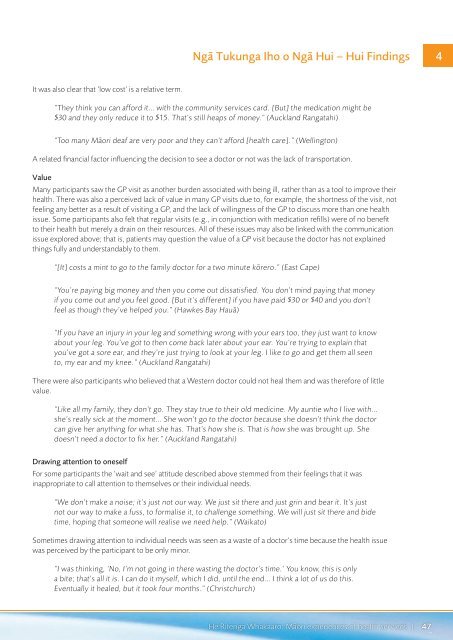He Ritenga Whakaaro - New Zealand Doctor
He Ritenga Whakaaro - New Zealand Doctor
He Ritenga Whakaaro - New Zealand Doctor
You also want an ePaper? Increase the reach of your titles
YUMPU automatically turns print PDFs into web optimized ePapers that Google loves.
Ngā Tukunga Iho o Ngā Hui – Hui Findings 4<br />
It was also clear that ‘low cost’ is a relative term.<br />
“They think you can afford it… with the community services card. [But] the medication might be<br />
$30 and they only reduce it to $15. That’s still heaps of money.” (Auckland Rangatahi)<br />
“Too many Māori deaf are very poor and they can’t afford [health care].” (Wellington)<br />
A related financial factor influencing the decision to see a doctor or not was the lack of transportation.<br />
Value<br />
Many participants saw the GP visit as another burden associated with being ill, rather than as a tool to improve their<br />
health. There was also a perceived lack of value in many GP visits due to, for example, the shortness of the visit, not<br />
feeling any better as a result of visiting a GP, and the lack of willingness of the GP to discuss more than one health<br />
issue. Some participants also felt that regular visits (e.g., in conjunction with medication refills) were of no benefit<br />
to their health but merely a drain on their resources. All of these issues may also be linked with the communication<br />
issue explored above; that is, patients may question the value of a GP visit because the doctor has not explained<br />
things fully and understandably to them.<br />
“[It] costs a mint to go to the family doctor for a two minute kōrero.” (East Cape)<br />
“You’re paying big money and then you come out dissatisfied. You don’t mind paying that money<br />
if you come out and you feel good. [But it’s different] if you have paid $30 or $40 and you don’t<br />
feel as though they’ve helped you.” (Hawkes Bay Hauā)<br />
“If you have an injury in your leg and something wrong with your ears too, they just want to know<br />
about your leg. You’ve got to then come back later about your ear. You’re trying to explain that<br />
you’ve got a sore ear, and they’re just trying to look at your leg. I like to go and get them all seen<br />
to, my ear and my knee.” (Auckland Rangatahi)<br />
There were also participants who believed that a Western doctor could not heal them and was therefore of little<br />
value.<br />
“Like all my family, they don’t go. They stay true to their old medicine. My auntie who I live with…<br />
she’s really sick at the moment… She won’t go to the doctor because she doesn’t think the doctor<br />
can give her anything for what she has. That’s how she is. That is how she was brought up. She<br />
doesn’t need a doctor to fix her.” (Auckland Rangatahi)<br />
Drawing attention to oneself<br />
For some participants the ‘wait and see’ attitude described above stemmed from their feelings that it was<br />
inappropriate to call attention to themselves or their individual needs.<br />
“We don’t make a noise; it’s just not our way. We just sit there and just grin and bear it. It’s just<br />
not our way to make a fuss, to formalise it, to challenge something. We will just sit there and bide<br />
time, hoping that someone will realise we need help.” (Waikato)<br />
Sometimes drawing attention to individual needs was seen as a waste of a doctor’s time because the health issue<br />
was perceived by the participant to be only minor.<br />
“I was thinking, ‘No, I’m not going in there wasting the doctor’s time.’ You know, this is only<br />
a bite; that’s all it is. I can do it myself, which I did, until the end… I think a lot of us do this.<br />
Eventually it healed, but it took four months.” (Christchurch)<br />
<strong>He</strong> <strong>Ritenga</strong> <strong>Whakaaro</strong>: Māori experiences of health services | 47

















